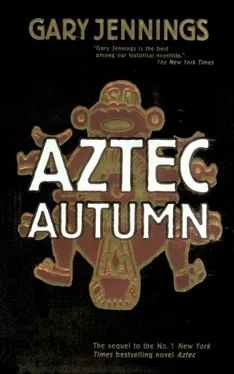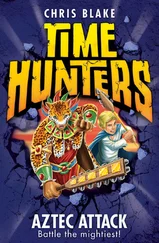Gary Jennings - Aztec Autumn
Здесь есть возможность читать онлайн «Gary Jennings - Aztec Autumn» весь текст электронной книги совершенно бесплатно (целиком полную версию без сокращений). В некоторых случаях можно слушать аудио, скачать через торрент в формате fb2 и присутствует краткое содержание. Жанр: Старинная литература, на английском языке. Описание произведения, (предисловие) а так же отзывы посетителей доступны на портале библиотеки ЛибКат.
- Название:Aztec Autumn
- Автор:
- Жанр:
- Год:неизвестен
- ISBN:нет данных
- Рейтинг книги:4 / 5. Голосов: 1
-
Избранное:Добавить в избранное
- Отзывы:
-
Ваша оценка:
- 80
- 1
- 2
- 3
- 4
- 5
Aztec Autumn: краткое содержание, описание и аннотация
Предлагаем к чтению аннотацию, описание, краткое содержание или предисловие (зависит от того, что написал сам автор книги «Aztec Autumn»). Если вы не нашли необходимую информацию о книге — напишите в комментариях, мы постараемся отыскать её.
Readers familiar with Mexican history will welcome the rich details of this vengeance drama; those new to it will be impressed by Jennings's exhaustive research.
Aztec Autumn — читать онлайн бесплатно полную книгу (весь текст) целиком
Ниже представлен текст книги, разбитый по страницам. Система сохранения места последней прочитанной страницы, позволяет с удобством читать онлайн бесплатно книгу «Aztec Autumn», без необходимости каждый раз заново искать на чём Вы остановились. Поставьте закладку, и сможете в любой момент перейти на страницу, на которой закончили чтение.
Интервал:
Закладка:
"Go and spread my message to every other community, as far abroad as you can take it. And to every man who volunteers, give those same directions I have just given."
I should remark that I was not collecting men who merely wanted to be warriors. All of these were well accustomed to battle, because their tribes so often fought with neighboring ones, over territorial boundaries or hunting grounds or even to abduct each other's women for wives. However, none of these rustics had any experience of mass warfare, of being a component in an army, of serving in organized contingents that would act in disciplined concert. I was relying on Nochéztli and my other knights to teach them all they would need to know.
I suppose it was only to be expected that as we five travelers made our way farther and farther to the northwest, I would find my message received with more incredulity than enthusiasm. The communities in those distant reaches of The One World were smaller and more isolated, one from another. They apparently had little wish or need for mutual intercourse or trade or even communication. The few contacts between or among them occurred only when two or more had occasion to fight each other—as did those communities we had previously visited—usually for causes that more civilized people would have thought trifling.
Even the numerous tribes of the Rarámuri country—the name means the Runner People—seemed seldom to have done their running very far from their home villages. Most of their headmen had heard only vague rumors of strangers from beyond the Eastern Sea having invaded The One World. Some of those men felt that if any such thing really had happened, it was a disaster so distant that it was of no concern to them. Others flatly refused to believe the rumors at all. And eventually our little group arrived in regions where the resident Rarámuri had heard nothing whatever of the white men, and several of them laughed uproariously at the notion that whole hordes of uniformly white-skinned persons could exist.
The prevailing attitudes of indifference or skepticism or outright disbelief notwithstanding, I continued to reap harvests of new recruits for my army. I do not know whether to credit that to my urgent and persuasive argument, or to the men's having got tired of fighting their neighbors and desiring new enemies to vanquish, or to their simply wanting to journey far from their old familiar and unexciting haunts. The reason did not matter; what mattered was that they took up their arms and went south toward Chicomóztotl.
The Rarámuri lands were the northernmost in which the names Aztéca and Mexíca were even remotely recognized, and the last in which we travelers could expect to be received with hospitality or even with toleration. When we passed around the rim of a magnificent waterfall, admiring its grandeur as we did so, G'nda Ké said:
"The cascade is called Basa-séachic. It marks the boundary of the Rarámuri country, and indeed the farthest limit to which the Mexíca, at the very peak of their power, claimed to hold dominion. When we follow the riverside below the falls, we will be venturing into the Yaki lands, and we must go cautiously and watchfully. G'nda Ké does not much care what a wandering party of Yaki hunters would do to the rest of you. But she does not want them slaughtering her before she has a chance to hail them in their own tongue."
So, from there on, we went almost as stealthily as Ualíztli and I had crept through the underbrush while escaping from Compostela. But the wariness proved to have been unnecessary. For the space of three or four days, we met no one, and by the end of that time our course had brought us down from the thickly forested mountains into a region of low-growth rolling hills. On one of those we saw our first Yaki—a hunting party of six men—and they saw us at the same moment, and G'nda Ké called to them some greeting that stopped them from charging upon us. They stayed where they were, and regarded her icily as she went ahead of us to introduce herself.
She was still earnestly talking to them in the unlovely Yaki language—all grunts and clicks and mumbles—as we other four approached. The hunters were not speaking at all, and gave us men only the same icy stare. But neither did they make any threatening moves, so while G'nda Ké yammered on, I took the opportunity to look them over.
They had good hawklike faces and strong-muscled bodies, but they were about as unclean as are our priests, and wore their hair just as long and greasy and tangled. They were bare to the waist, and at first, I thought they were wearing skirts made of animal pelts. Then I made out that the skirts were of hair hanging loose all around, hair as long as their own and much longer than grows on any wild animal. It was human hair, the dried scalps still attached and tied about the men's waists with belt ropes. Several of them had added to the skirts the game they had slain this day—all small animals, carried by their tails tucked into those scalp belts. I might mention here that all kinds of game are abundant in those lands, and are eaten by the Yaki. But their men like best the meat of the pouch-bellied tlecuáchi, because it is so heavily larded with fat, which they believe gives them endurance in their hunting or fighting forays.
Their weapons were primitive, but hardly less lethal for that. Their bows and spears were of cane, their arrows of stiff reed and the spears were similar to those used by some fisher people, having three pointed prongs at the striking end. The arrows and spears were tipped with flint, a sure sign that the Yaki never had dealings with any of the nations to the south, where obsidian comes from. They had no swords like our maquáhuime, but two or three of them carried—dangling from thongs about their wrists—clubs of the quauxelolóni wood that is as hard and heavy as Spanish iron.
One of the six men now grunted a brief remark to G'nda Ké, jerked his head backward in the direction from which they had come, and they all turned and went that way. We five followed, though I wondered if G'nda Ké had merely urged her countrymen to take us to some larger gathering of hunters, where we could more easily be overpowered, scalped and slain.
Either she had not, or if that had been her intent, she had failed to persuade them. They led us, without ever once turning their heads to see if we came along, through the hills and through the rest of that day until, at evening, we came to their village. It was situated on the north bank of a river called, unsurprisingly, the Yaki, and the village was named, unimaginatively, Bakúm, which means only "water place." To me it was a village, and a meager and exceptionally squalid one, but G'nda Ké insisted on calling it a town, explaining:
"Bakúm is one of the Uonáiki—that is, one of the Eight Sacred Towns—founded by the revered prophets who begot the whole race of us Yaki in the Batna'atóka—that is, in the Ancient Time."
In the matter of living conditions and amenities, Bakúm appeared to have made very little progress since that Ancient Time, however long ago that had been. The people dwelt in dome-shaped huts crudely made of split cane crisscrossed into mats, and the mats laid overlapping. The entire village—every Yaki village I visited—was enclosed by a high fence of cane stalks held together and upright by intertwined vines. I had never before, anywhere in The One World, seen any community so seclusive and unsociable that it fenced itself off from everybody and everything beyond. None of the huts was a steam hut, and despite the village's name of "water place," it was unpleasantly evident that the villagers took from the river only drinking water, never washing water.
The river's plentiful canes and reeds were employed for every conceivable purpose, not just for weapons and building mats and fencing material, but also for all the utensils of daily life. The people slept on woven-reed pallets, the women used split-cane knives and scooped-out cane spoons in their cooking, the men wore cane-and-reed headdresses and tootled on cane whistles in their ceremonial dances. The only other evidences of artisanry that I saw among the Yaki were ugly brownware clay pots, carved and painted wooden masks and the cotton blankets woven on back-strap looms.
Читать дальшеИнтервал:
Закладка:
Похожие книги на «Aztec Autumn»
Представляем Вашему вниманию похожие книги на «Aztec Autumn» списком для выбора. Мы отобрали схожую по названию и смыслу литературу в надежде предоставить читателям больше вариантов отыскать новые, интересные, ещё непрочитанные произведения.
Обсуждение, отзывы о книге «Aztec Autumn» и просто собственные мнения читателей. Оставьте ваши комментарии, напишите, что Вы думаете о произведении, его смысле или главных героях. Укажите что конкретно понравилось, а что нет, и почему Вы так считаете.











